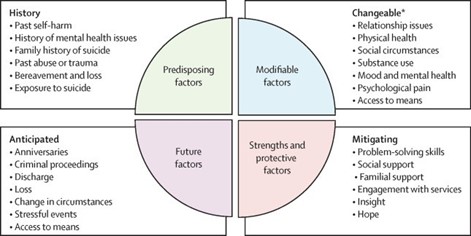A therapist recently convicted of multiple counts of Medicare fraud says, "Sure I overbilled. Why not? Takes advantage of the government, so I did too, it is not a problem."
These statements show:
Select one:
lack of remorse or guilt
suspiciousness.
shame.
decreased empathy.
The Correct Answer is A
The therapist's statement shows a lack of remorse or guilt for committing Medicare fraud. The statement suggests that the therapist does not see anything wrong with overbilling Medicare and taking advantage of the government. This lack of remorse or guilt is a common trait seen in individuals who engage in fraudulent behaviour.
Nursing Test Bank
Naxlex Comprehensive Predictor Exams
Related Questions
Correct Answer is D
Explanation
Autonomy is the ethical principle that upholds an individual's right to self-determination and decision- making regarding their own life and treatment. In this case, the unit manager's policy of allowing clients to make their own choice about whether or not to attend group therapy preserves the principle of autonomy.
By not mandating group therapy, the unit manager respects the clients' right to make decisions about their own treatment and encourages them to participate in a way that feels comfortable and aligned with their own goals and values. This promotes a sense of empowerment and self-efficacy in clients, which is important for their overall recovery and well-being.
While beneficence, non-maleficence, and justice are also important ethical principles in healthcare, they are not directly applicable to this particular situation.
Correct Answer is C
Explanation
Schizophrenia is a severe mental illness associated with an increased risk of suicide. Individuals with schizophrenia are at a higher risk of suicide due to the presence of symptoms such as depression, hopelessness, and social isolation. Unemployment is also a risk factor for suicide as it can contribute to financial and social stress.
The other options do have some risk factors, but not as high as the individual in option c. Alcohol use and being independent-minded are not necessarily significant risk factors for suicide, and being active in church can be a protective factor. While depression is a significant risk factor for suicide, it is not the only factor, and having two best friends may be a protective factor. Diabetes, in and of itself, is not a risk factor for suicide.

Whether you are a student looking to ace your exams or a practicing nurse seeking to enhance your expertise , our nursing education contents will empower you with the confidence and competence to make a difference in the lives of patients and become a respected leader in the healthcare field.
Visit Naxlex, invest in your future and unlock endless possibilities with our unparalleled nursing education contents today
Report Wrong Answer on the Current Question
Do you disagree with the answer? If yes, what is your expected answer? Explain.
Kindly be descriptive with the issue you are facing.
